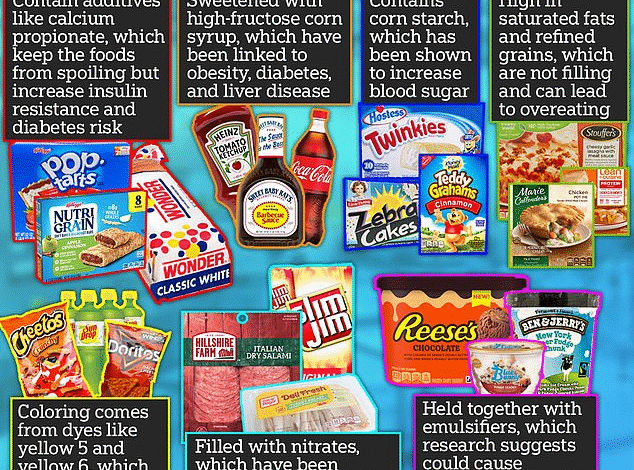Ultraprocessed Food: A Major Risk to Health and Mortality

Ultraprocessed food is rapidly becoming a focal point in discussions about public health, primarily due to its alarming association with serious health risks, including premature death. Recent studies highlight the detrimental impact of ultraprocessed foods on overall mortality rates, revealing significant correlations in various countries. For instance, research published in the American Journal of Preventive Medicine emphasizes that individuals consuming high amounts of these foods may face a risk increase of up to 14%. Furthermore, the findings underscore the imperative need for updated dietary guidelines that address ultraprocessed food consumption and its role in chronic diseases. As the push for healthier eating practices grows stronger, understanding the health risks of ultraprocessed food has never been more crucial.
Highly processed food items, often laden with artificial ingredients and preservatives, have ignited concern regarding their long-term effects on health. These industrial snacks and meals, commonly termed as processed foods, have shown a disturbing link to various adverse health outcomes. Studies consistently indicate that high consumption levels can lead to increased risks of obesity, cardiovascular diseases, and even mental health issues. The evidence suggesting that reducing these foods from our diets may significantly lower preventable deaths further reinforces the need for public awareness. As we navigate the evolving landscape of nutrition, the impact of processed food choices must be critically evaluated.
Understanding the Dangers of Ultraprocessed Foods
Ultraprocessed foods (UPFs) are often laden with artificial ingredients, preservatives, and unhealthy fats that elevate their risk profile significantly. Studies have shown that these products contribute disproportionately to the overall burden of disease, a notion supported by recent findings highlighting their association with premature mortality. The American Journal of Preventive Medicine has brought attention to how ultraprocessed foods can lead to a myriad of health problems including obesity, cardiovascular diseases, and diabetes, thereby necessitating a closer examination of our dietary choices.
The correlation between ultraprocessed food consumption and adverse health outcomes has become increasingly clear. In the analysis conducted across multiple countries, researchers noted a stark relationship between high intake of UPFs and higher rates of all-cause mortality. This suggests that dietary guidelines should not only warn against excess processed foods but actively advocate for reducing UPF consumption as a means to enhance public health and extend life expectancy.
Frequently Asked Questions
What are the health risks of ultraprocessed food consumption?
Consuming ultraprocessed foods has been linked to numerous health risks, including obesity, cardiovascular disease, diabetes, and mental health issues. Studies have shown that ultraprocessed food intake contributes significantly to overall disease burden and increases the risk of premature death.
How does ultraprocessed food impact overall mortality rates?
Research indicates that ultraprocessed food consumption is associated with higher all-cause mortality rates. For instance, a recent study found risk variations from 4% in Colombia to 14% in the U.K. and U.S., highlighting the significant impact that these foods can have on public health.
What did the ultraprocessed foods study reveal about diet and health outcomes?
The ultraprocessed foods study revealed a strong correlation between high consumption of ultraprocessed foods and adverse health outcomes, reinforcing the need for dietary guidelines that limit these foods to reduce preventable deaths and improve population health.
What are the dietary guidelines for ultraprocessed food consumption?
Dietary guidelines recommend minimizing the intake of ultraprocessed foods due to their association with increased health risks, including cardiovascular disease and obesity. Reducing ultraprocessed food consumption is crucial for improving overall health and longevity.
Can reducing ultraprocessed food consumption lower risks of premature death?
Yes, reducing ultraprocessed food consumption can potentially lower the risks of premature death. The study indicated that countries with higher consumption of these foods have more significant health impacts, suggesting that dietary changes could lead to improved health outcomes.
Why are ultraprocessed foods considered detrimental to health?
Ultraprocessed foods are considered detrimental to health because they often contain high levels of sugars, unhealthy fats, and additives, while being low in nutrition. Their consumption has been linked to a variety of health issues, including obesity, which contributes to early mortality.
What findings support addressing ultraprocessed food in public health policies?
Recent findings indicate a significant link between ultraprocessed food consumption and all-cause mortality in multiple countries. Researchers advocate for public health policies that aim to reduce ultraprocessed food intake as an essential step in improving national health outcomes.
What alternatives to ultraprocessed foods can improve health?
Alternatives to ultraprocessed foods include whole, plant-based foods such as fruits, vegetables, nuts, and whole grains. These foods are linked to better health outcomes, including lower risks of chronic diseases and longer life expectancy.
| Key Points |
|---|
| New research links ultraprocessed food to premature deaths across eight countries, including the U.S. and U.K. |
| A study published in the American Journal of Preventive Medicine highlights the epidemiologic burden due to ultraprocessed food consumption. |
| The analysis indicates that ultraprocessed foods are associated with a 4% to 14% increase in all-cause mortality depending on the country. |
| UPF consumption is linked to over 32 adverse health outcomes including obesity, cardiovascular diseases, and diabetes. |
| Lower consumption of UPFs could significantly reduce preventable deaths in countries with high UPF intake. |
| Health officials are responding by phasing out harmful additives like petroleum-based synthetic dyes from food supplies. |
Summary
Ultraprocessed food poses a significant risk to health, contributing to premature death and a multitude of health issues across numerous countries. As research continues to reveal the dangers of such foods, it is increasingly clear that their reduction should be prioritized in dietary guidelines and public health policies. This is particularly vital in nations like the U.S. and U.K., where ultraprocessed foods dominate diets, leading to adverse health outcomes. The push to eliminate harmful additives indicates a growing awareness of the issues posed by ultraprocessed food consumption and the urgent need for a dietary shift towards healthier options.




